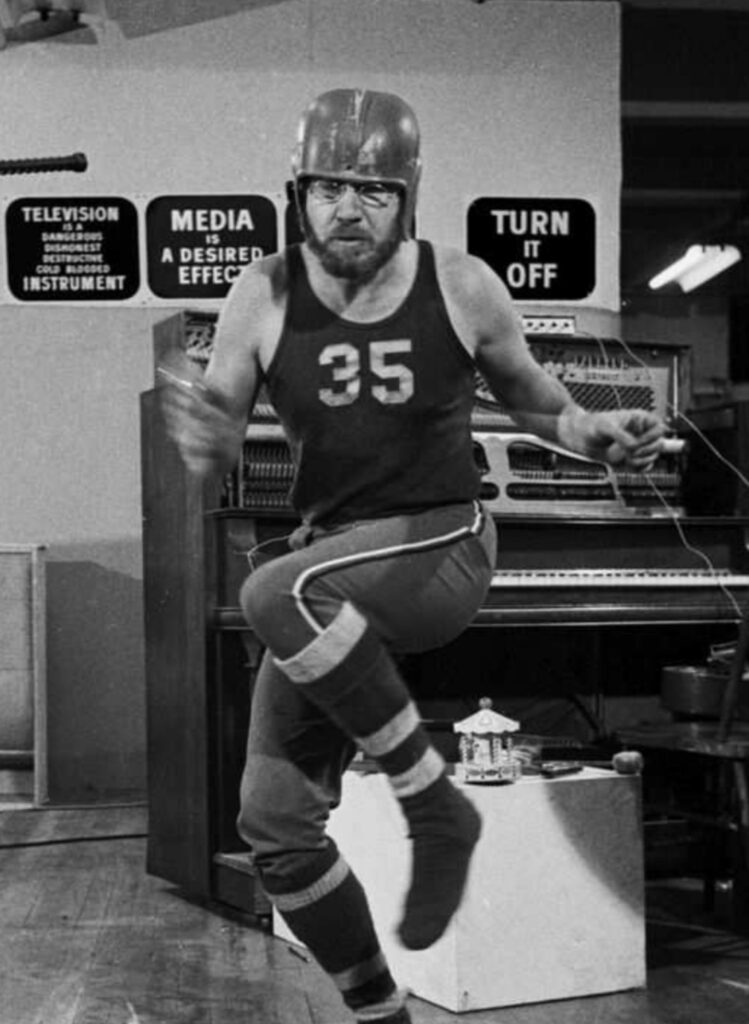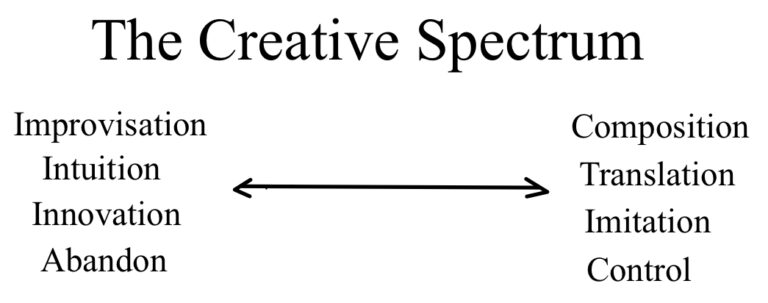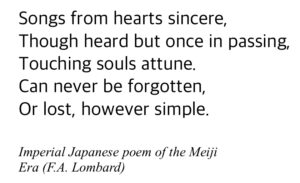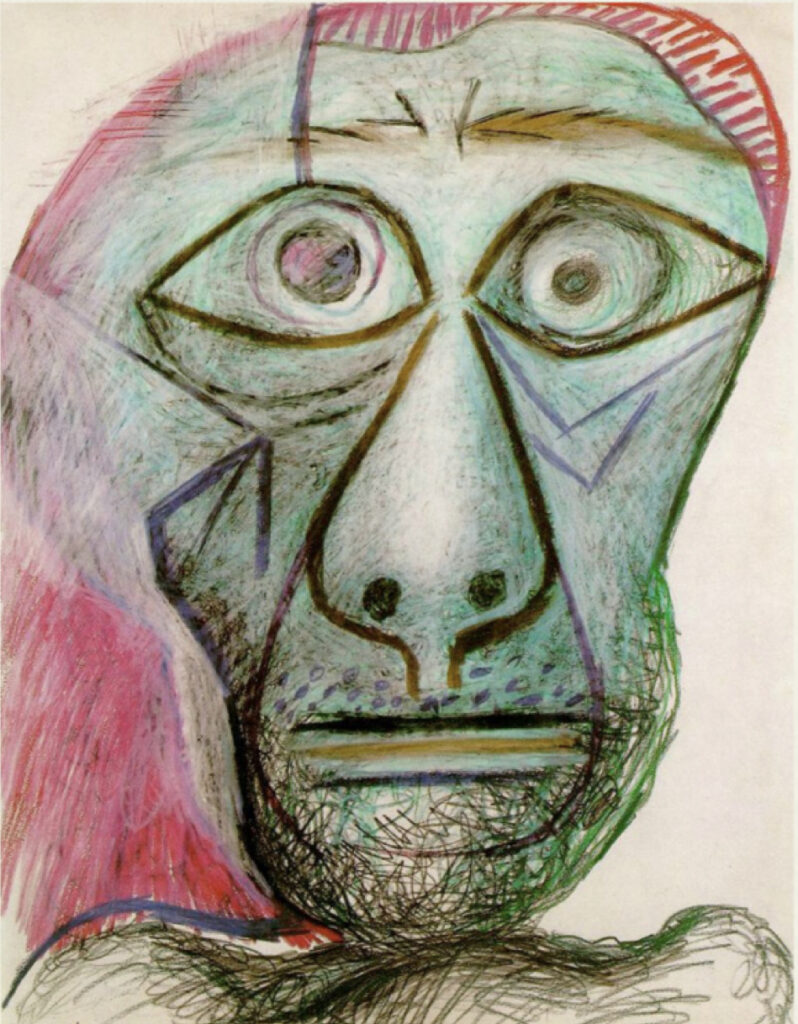
Al Neil, Vancouver B.C.
Our Approach
“Learned technique is a law method; natural technique is nature’s method. And this is what makes music so beautiful to me. It has both, thank God, and the art of Jazz builds with the two”. Ornette Coleman
Try thinking of your Jazz explorations as living on a spectrum between pure improvisation at one end, and pure composition at the other. We can move inward from these extremes. Giving more structure to our improvisation, on the one hand, or giving more interpretation to a composition, on the other.
Listen < > Speak < > Trust

From Abandon...
...Toward Control
“Finally I said that the purpose of the purposeless music would be achieved if people learned to listen; that when they listened they might discover that they preferred the sounds of everyday life to the ones they would presently hear in the musical program; that that was alright as far as I was concerned.” John Cage
“Freedom lies, first and foremost in the opportunity to make a conscious choice from boundless material.” Ekkehard Jost
Abandon – “A complete lack of inhibition or restraint.”
Exercise: Try to play completely randomly. Set the instrument in motion (child-like). Think of a random tone generator. Create a “sound-bed”.
Why? – Right from our first piano lessons it becomes ingrained that there are “right” and “wrong” notes. We became self-conscious; afraid of making mistakes.
We want to silence this critic in our head. We just want to LISTEN.
Exercise: Let’s start to move toward control by making some choices. Try adding some tension and release by introducing these components to your sound bed one at a time.
(1) Dynamics – changes in loudness.
(2) Register – changes in frequency of vibration.
(3) Duration – changes in the time a note sounds (staccato and legato).
(4) Activity – changes in the number of notes per duration of time (rhythm)
(5) Pattern – Introduction of sameness.
“Few people can say “I am here”. They seek themselves in the past and see themselves in the future.” George Braque
“Musical form in the narrow sense has ultimately only two basic aspects: Repetition and Recurrence.” Groves Dictionary of Music
From Control...
...Toward Abandon
“The study of paradigms is what mainly prepares the student for membership into the particular musical community with which he will later practice.” Thomas S. Kuhn (paraphrased)
“Every composition that we come up with is a means to get to a different type of improvisational area.” Bruce Ackley of Rova
Paradigms – “Patterns, examples or models used by a group to define the parameters and objectives of a genre or style.”
Exercise: Carefully learn and study the compositions written by Jazz musicians you admire. You can start with songs in ‘Our Analysis’!
Why? – It’s the most direct way to grasp the norms of a style Far better than trusting the theorists that followed .
Variation – Transforming without altering a composition’s essence.
Exercise: Begin by moving away from the composition gradually – alter the melody, rhythm or harmony bit by bit. (Check out Sonny Rollins playing ‘St. Thomas’ 1956)
Why? – It increases your understanding of the piece and relieves the pressure of launching into a full blown improvisation.
“Music came first; then the scales occurred after ages of experiment; then came the theorists to explain them. And, as they knew more of mathematics than of musical history, they laid down laws which, in actual fact, no human being had ever obeyed.” Sir Percy Buck

As it turns out, this idea of “Abandonment” is not some abstract concept. Charles Lamb has shown that it is an actual neurological reality (Check out the Ted Talk video). Any golfer will tell you that a good golf swing is a complex set of movements that require analysis and practice, but when one arrives on the golf course there is a need to forget about the analysis and Trust your muscle memory to put together a good swing.
Listen < > Speak < > Trust
A few more thoughts on Creating Music...
Sure, she said, as Pablo once remarked, “When you make a thing, it is so complicated making it that it is bound to be ugly, but those that do it after you, they don’t have to worry about making it and they can make it pretty, and so everybody can like it when the others make it.” Gertrude Stein on Pablo Picasso

“Originality can not be a goal. It is simply inevitable – the truly path-breaking step can never be predicted, and certainly not by the person who makes it at the time he makes it. He clears as he goes, evolves his own techniques, devises his own tools, ignores where he must. And his path cannot be retraced because each of us is an original being.” Harry Partch (Genesis of Music)
“Actually however, I don’t believe in freedom. I don’t think anything like that exists in the world or in music. I think there are higher laws – although, as you move under higher laws, you may operate under fewer laws, thus moving in a state of relative freedom as compared to being under numerous smaller laws. But there’s always a law in music.” George Russell
“Creative mythology springs not, like theology, from the dicta of authority but from the insights, sentiments, thought and vision of an adequate individual, loyal to his own experience of value.” Joseph Campbell
“… in a larger context, where a team, a company, a tribe, or people shares significant common experiences, a language inevitably comes into being that is, in depth, unintelligible to outsiders, even where it’s rational or pragmatic import may seem to be obvious and translatable.” Joseph Campbell
“In art it is imagination, constructive and otherwise that is inexorable; the demonstrable facts lie completely within the realm of materials and means, which are quite neutral and in the absence of imagination lead precisely nowhere.” Rodger Sessions
“You would not believe what I have had to suffer from incompetent textbooks.” Johannes Brahms
“You can tear a poem apart to see what makes it technically tick and say to yourself when the works are laid out before you – ‘the vowels, the consonants, the rhyme and the rhythm – Yes this is it! This is why the poem moves me so, it is because of the craftsmanship.’ But you are back again where you began. The best craftsmanship always leaves holes and gaps in the works of a poem so that something that is not in the poem can creep, crawl, flash or thunder in.” Dylan Thomas
“He (Thelonious Monk) told me to simplify my stuff and keep to the point and make the drummer sound good.” Steve Lacy
“A performer who seeks to merely dazzle the audience with feats of technical brilliance plays to the lowest level of understanding,, foregoing the risks that come from intense emotional engagement with the material itself.” Curt Sachs
“I didn’t try and overdo it or nothing. I just enjoyed playing in good bands.” Louis Armstrong
